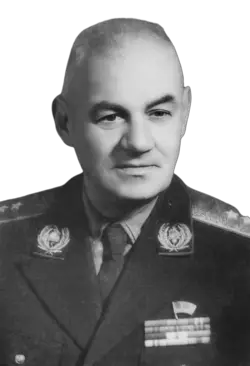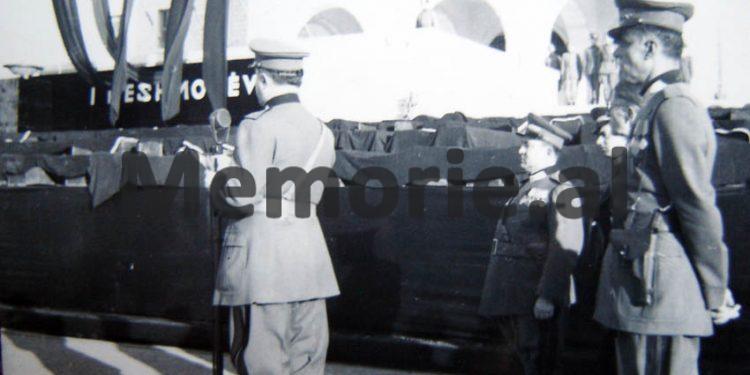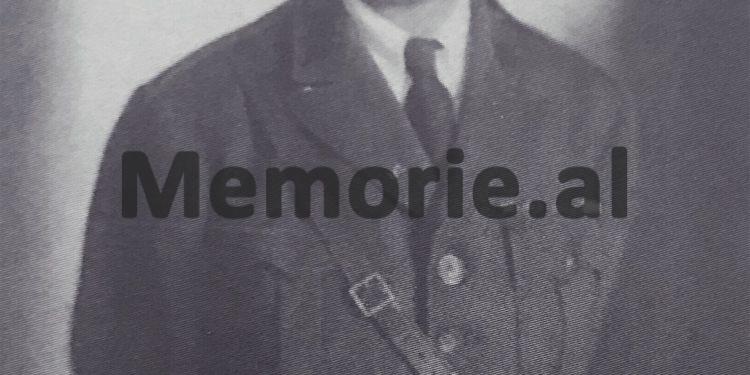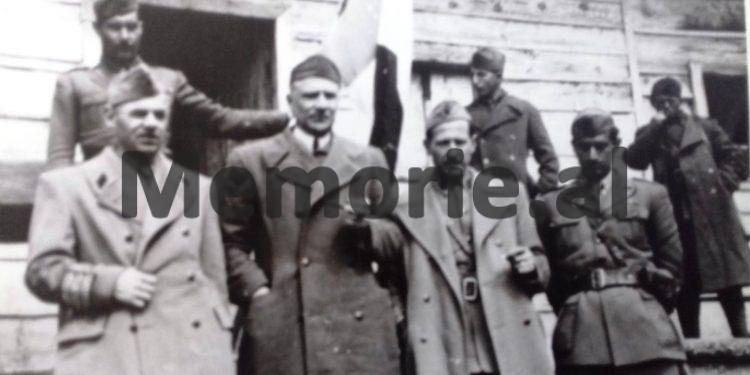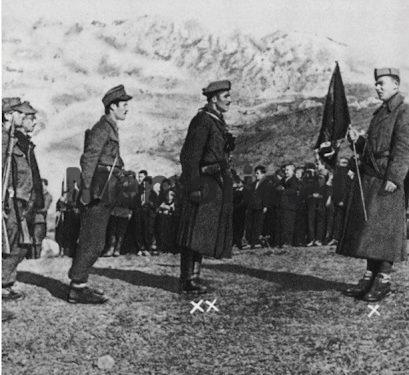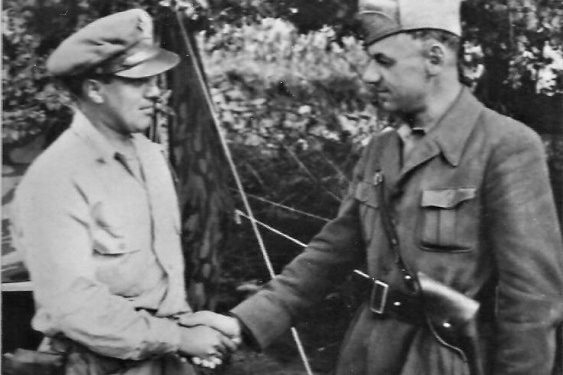Memorie.al/Arqile Moisiu, the son of the first commander of the National Liberation Army, Major General Spiro Moisiu, and the brother of the former President of the Republic, Alfred Moisiu, now retired, has revealed some details of his father’s activities during and after the war. In a recent interview with journalist Gerti Shella, Arqile Moisiu provided details about his father’s relationship with Enver Hoxha and the clashes he had with him.
Mr. Moisiu, can you recall those first moments when your father decided to align himself with the anti-fascist forces?
At the beginning of World War II, my father had left Zog’s army. When the Italo-Greek war began, he was with the “Tomorri” battalion, which deserted from the front because it refused to fight against the Greeks. He was sentenced to hanging but was later pardoned by the Duce, along with a group of officers. At this time, he returned to his family and lived in Lushnjë with his brother.
There, he came into contact with the first National Liberation Movement. The Carabinieri came to arrest him, but couldn’t, and after that, he lived in hiding. He was elected chairman of the National Liberation Council of the Myzeqe area and commander of the Myzeqe partisan detachment. From this point, he was called to the Labinot conference in 1943, where he was proposed as Commander of the National Liberation Army.
How did he receive this proposal at the time?
At first, he did not want to accept such a duty, as it seemed like a heavy burden to lead an army that was in the process of formation and expansion and which was not built on military principles.
It is said that Enver Hoxha influenced your father to lead this army…?
In fact, there were many members there who were for him, as he had a rich military career and values that he had demonstrated. He accepted this duty for the sake of the nationalism and patriotism that were in his character. He felt prepared and that he could do this duty that was being entrusted to him.
Do you remember the professional challenges in terms of mobilization and directing the war?
At that time, although there were many partisan detachments, there was no complete connection between them and they were unorganized. This was one of the most difficult tasks to accomplish, as the army was not organized in a scientific way.
At the Përmet Congress, Major Spiro Moisiu was appointed Chief of the General Staff from his position as General Commander. How did your father experience this change?
I don’t know for sure if he had any regret about this decision, but I can tell you with conviction that he showed nothing of the sort. So, he showed no regret.
What was the relationship between your father and Enver Hoxha after the latter took the post of General Commander of the Army?
Their relationship was influenced by their political views, as my father was not a member of the Communist Party when he entered the war. He became a member of the Communist Party in 1943. So, the war he fought was as a patriot, and the relationship was defined by this. Enver Hoxha held the stance of a political party secretary, while my father maintained the stance of a patriot, who sought to liberate the country from the occupiers.
In photos, General Moisiu is always one step behind Hoxha. Is this an indication, or was it a trait of your father’s modesty…?
First, I would say it’s an indication of the relationship between them, and then comes the modesty. Because he made a big name for himself in the war. I remember once we met a family, and the owner of the house told us how, when Major “Kavaja” (my father’s nickname) entered their hut, everyone knew him, but they didn’t know Enver Hoxha and left the corner seat for him.
During 1940-1944, you lived in hiding; I assume you saw your father very rarely…?
We saw each other very little, and I was in hiding with a different name, Agim, as were my brother, sisters, and mother. We had fake passports, and we were still under constant pursuit and were on the move – in Tirana, Shijak, Kavajë – to hide.
Do you remember any episode where you and your family escaped arrest…?
There was such a case, when we were in Shijak, where we were sheltered by a family of beys, who at that time were known as families who supported the occupiers and were not touched by them. The Germans were checking houses, and when they came to our house, they did not check and we were saved.
Were there Albanian collaborators with fascism at that time?
Yes, there were armed ones, who worked against the National Liberation Anti-Fascist War.
Did you ever feel threatened because of the collaborators?
Yes, of course, especially in Tirana. We were in a house on the street of the embassies. There we felt the persecution that was being done to us by Albanians, and later we were followed by detachments, the detachment of one person whose name I don’t remember, but I recall he was from the district of Tirana.
What about Spiro Moisiu’s post-war relationship with Enver Hoxha? What were they like?
They were relationships influenced by the concept they had for the army. I remember from my father that his first clash with Enver Hoxha was over the issue of Yugoslav advisors, for the reorganization of the army after liberation. My father opposed this request, as he thought that the Yugoslav officers had come from the war just like our partisans; that is, they were at the same stage as us. So, he thought that their experience was no greater than the experience our partisans had. At that time, it was eluded that Spiro Moisiu was pro-Russian.
This was the period when there was a clash with Koçi Xoxe. Do you remember any details related to this event?
At that time, although I was young, it seemed unusual to me, because I knew my father had been a partisan and we had lived in hiding, and one beautiful day my father came home and said he had been relieved of his duty.
How old was General Moisiu at this time?
He was 48 years old. So, at the peak of his career. And there he felt the persecution that Koçi Xoxe was doing to him. I even remember that at that time, we were on “Fortuzi” street; there was a villa that was confiscated and we were guarded by two or three civilian officers of the Ministry of Internal Affairs, who guarded us and watched all my father’s movements. He always instructed us not to show where he was going, because he knew that he was under constant surveillance and that they were trying to arrest him.
What happened after Koçi Xoxe’s arrest?
After Xoxe’s arrest, my father was reinstated in the Army. He wore the officer’s uniform again, even though the duty he was given was of no importance. He was the head of a non-political association called SHNUM (Association in Aid of the Army and Defense). This was an activity that he undertook with great pleasure, and he trained many cadres.
What rank did your father hold at this time?
He was a Major General. Later, one year before he retired, he became a Lieutenant General, and he retired with that rank. He was quite vital, and they wanted to keep him in the Ministry of Defense as Inspector in the Army, but he did not accept such a duty. He also had his military pride.
In the Moisiu family, how is November 29th celebrated?
We have a family tradition of celebrating November 29th, in respect not only for the war my father fought, but also in respect for the Albanians who took part and gave their lives in the war for the liberation of the country. So, it is a holiday that is commemorated in a simple way.
Do the sons of General Moisiu agree that November 28th could serve as a single date to commemorate both Albania’s independence and the victory of the war?
I do not agree.
Why?
There are plenty of arguments for and against this issue, but from the school we went to and with the preparation we received, we know that the war ended on November 29th and the liberation of Shkodra took place on November 29th. It has nothing to do with the fact that Yugoslavia was also liberated on this date, and it does not seem like a scientific argument to me at all.
If you were in your Brother Alfred Moisiu’s post, do you think it would be a difficult task to maintain a balance between the Ballists and the partisans?
In the post he had, this is a primary task, because he represents the entire nation, but I think it is difficult. Because these kinds of concepts are deeply entrenched among us, between Ballist families and those of partisans. / Memorie.al
Interviewed by Gerti Shella




